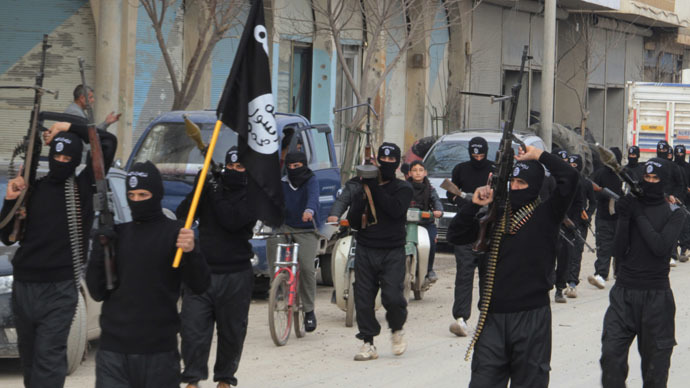3,000 ISIS infiltrators may enter Turkey, plan to attack diplomatic targets – report

Up to 3,000 trained jihadists are seeking to cross into Turkey from Syria and Iraq, with intentions of striking diplomatic targets belonging to anti-ISIS coalition partners, the Turkish intelligence service told the police in an internal memo.
"The jihadist militants could be working on armed or bombing attacks in Ankara and Istanbul against the diplomatic missions of the countries involved in the US-led anti-ISIL [ISIS] coalition,” said the Hurriyet newspaper, citing the Turkish National Intelligence Organization (MİT).
The agency, which refused to provide additional information when contacted by Reuters, warned the police that Islamic State (IS, formerly ISIS/ISIL) jihadists repelled from the predominantly Kurdish town of Kobani in Syria, are now looking for ways to cross the border. Hurriyet said that MIT sent a warning as far back as February 3 to local police departments, in an attempt to intercept the flow of terrorists.
It was unclear how many of the jihadists have already penetrated the Turkish border, but MIT said that some have already been sheltered in safe houses in the south of the country. MIT reports that some of the terrorists – a group of men from 17 to 25 from Palestine and Syria - intend to cross into Bulgaria, and from there into the rest of the EU.
Kurds retake #Kobani as #ISIS admits retreat http://t.co/pPoCESJYlRpic.twitter.com/uevALkFO5z
— RT (@RT_com) February 1, 2015
Last month, Turkey declared that 3,000 people – a figure that does not include the potential new influx - inside the country have connections with the radical Sunni movement. Moreover, the Turkish foreign ministry says there are between 700 and 1,000 Turkish fighters in the group, whose potential return concerns Ankara. The country has already deported over a thousand people and slapped an entry ban on 7,800 others.
Jihadists reportedly control many points on the Syria-Turkish border. Ankara has repeatedly been accused of not taking action to stop the flow of extremists seeking to join the Islamic State in Syria.
Moreover, Damascus accused Turkey of providing logistic support to Islamic radicals fighting in Syria.
READ MORE: ‘Sleeper cells’: 3,000 in Turkey linked to ISIS, police report says
"Is it Turkey's fault it has borders with Syria?" Turkish Prime Minister Davutoglu recently said, responding to calls by Germany’s domestic intelligence chief Hans-Georg Maassen to take more action to prevent jihadists from entering Syria and Iraq via Turkey. "We need to receive intelligence first so we can track people.”
The Islamic State, which has set itself the goal of creating a Sunni caliphate stretching across the Middle East and beyond, has recently indicated a greater focus on targets outside the conflict zone in Iraq and Syria.
There have been several suspected terrorist attacks in Turkish border regions in recent months, the last one just last week, when a car bomb exploded at a police checkpoint.
A recent pamphlet distributed by ISIS sources, and translated into English earlier this week, states the organization should create “pandemonium” in Europe, through infiltrating the outflow of refugees crossing from Libya into southern Europe.














